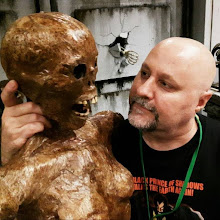From the press release: The supernatural has served as a useful means of explaining complicated natural processes in terms humans understand. As history’s famous witch-hunts have demonstrated, the supernatural is also a potent weapon for exerting control over individuals whose behaviour or appearance fail to conform to the ‘norms’ of the community. Conversely, the supernatural can also provide a means of expressing minority beliefs in a way that challenges the power of mainstream organized religions.
Although submissions are now closed for this conference, it looks like it will be an interesting one! Will be taking place from April 1-3, 2017 in Lisbon, Portugal.
More info from the press release:
Contemporary novels, films, and religious practice all embrace the supernatural with open arms. From vengeful gods and goddesses and witches to poltergeists and hauntings, to demonic possession and the accompanying exorcism rituals, the human imagination has been captivated for millennia by the power of forces that operate outside the laws of nature and the relationship between humans and the spirit world. Over time, the supernatural has served as a basis for titillating audiences and generating fear. Whether that fear is used to entertain an audience or control a population, the threat of supernatural retaliation is among the most potent motivators we know.
The 2017 project meeting hopes to build on the insights of last year’s conference. The unexpected preponderance of Disney-related discussions surprised all the participants. The Disney footprint seems to be inescapable when discussing depictions of many of these characters and the tales in which they appear. The yearning for ever more terrifying special effects or horrifying plot twists demand that authors and filmmakers search out new folklore and legends to inspire their work as well as discover new ways to tell old tales. New threats to serve as motivators are required as the old threats became mundane, “ho-hum,” and discredited. The supernatural offers a source of personal comfort in the face of grief by providing assurance that a departed loved one is watching over us. However, as the long line of supernatural hoaxes reveal, however, this longing to believe in the afterlife can enable schemes designed to manipulate and swindle vulnerable people and con artists are also always looking for new ways to cheat their victims.
The supernatural has served as a useful means of explaining complicated natural processes in terms humans understand. As history’s famous witch-hunts have demonstrated, the supernatural is also a potent weapon for exerting control over individuals whose behaviour or appearance fail to conform to the ‘norms’ of the community. Conversely, the supernatural can also provide a means of expressing minority beliefs in a way that challenges the power of mainstream organized religions.
What purpose does the supernatural serve in 21st century societies? Is it a throwback to the irrational, superstitious and archaic beliefs of a so-called primitive era, or is it a reminder that there is more to existence than the ‘truths’ revealed by the sciences? The Supernatural interdisciplinary research and publishing event aims to interrogate and investigate the supernatural from a variety of perspectives in order to understand the uses and meanings of the supernatural across time and cultures.
Subjects for presentation include, but are not limited to, the following:
The Supernatural in Theory and Practice
- Shifting perspectives of what is supernatural over time and across cultures
- Non-Western perspectives on the supernatural
- What attitudes toward the supernatural suggest about human perceptions of the boundaries between worlds
- Ancestor worship and the cultures in which this tradition is practiced
- Witchcraft, voodoo and the cultures where these traditions are practiced
- Satanism and cultural perceptions of this belief system
- Reasons behind the enduring fascination with supernatural evil, including philosophical, theological and anthropological perspectives on this question
- Relationship between the supernatural and magic
- Religious traditions and the supernatural (supernatural aspects of faith and belief, attitudes of faith traditions toward the supernatural, how clergy respond to individuals who report supernatural experiences, etc.)
The Supernatural and Real Life
- Socially accepted forms of supernatural belief and the factors that make some beliefs more acceptable than others
- Harms and benefits of believing in the supernatural
- Relationship between the supernatural and cruelty
- Apocalyptic supernatural evil events or characters and the significance of millenarianism
- Characteristics of supernatural entities and the significance of their difference from/similarity to human traits
- Relationship between the supernatural and social power/ideologies (e.g. witchcraft as pretext for dealing with non-conforming women, using the supernatural to engage with physical enemies, etc.)
- Legal/legislative approaches to restricting or enabling supernatural belief (limits of religious freedom principles, state-sanctioned punishment of witches, etc.)
- Medical/clinical perspectives on belief in the supernatural: the neuroscience behind (dis)belief, clinical responses to individuals who report supernatural experiences
- Science and the supernatural: using science to (dis)prove supernatural occurrences
- Technologies that facilitate/measure/prove engagement with the paranormal/occult
- Future of the supernatural in a world increasingly driven by science and reason
Supernatural Encounters
- Analyses of reports of supernatural encounters: common conventions of reports, style and mode of recounting experience, impact of titillation versus simple reporting of events in the reports of these encounters
- How the function and/or interpretation of a report of supernatural evil changes over time or across cultures
- Impact of oral traditions, artistic renderings and generic conventions on the telling and reception of accounts involving supernatural encounters
- How the reception of reports of the supernatural is influenced by the experience of listening versus reading or viewing
- Emotional and intellectual pleasures associated with the supernatural: pleasures of fear and titillation, etc.
- Comedic interpretations of supernatural evil: haunted houses in amusement parks, horror movie spoofs, etc
- Supernatural in film, television (including reality series like Most Haunted and Ghost Hunters), theatre, music, art and literature—and how they differ from more ‘traditional’ accounts
- Supernatural spaces: spaces associated with evil and the economic benefits/tourism implications of such connections
- Hoaxes, frauds and swindles
Supernatural and Live Performance
- Curated film screenings
- Performances (dramatic staging, dance, music)
- Readings
- Art installations
Organising Chairs:
Stephen Morris: smmorris58@yahoo.com
Rob Fisher: supernatural2@inter-disciplinary.net
This event is an inclusive interdisciplinary research and publishing project. It aims to bring together people from different areas and interests to share ideas and explore various discussions which are innovative and exciting.
All papers accepted for and presented at the conference must be in English. Selected papers will be developed for publication in a themed hard copy volume(s). All publications from the conference will require editors, to be chosen from interested delegates from the conference.
Conference Outcomes and Outputs
The conferences we organise form a continual stream of conversations, activities and projects which grow and evolve in different directions. The outcomes and ‘outputs’ which can productively flow from these is a dynamic response to the gatherings themselves. And as our meetings are attended by people from different backgrounds, professions and vocations, the range of desirable outcomes are potentially diverse, fluid and appropriate to what took place.For detailed information on possible outcomes and outputs, please click here. (This will open a new window).
All accepted papers presented at the conference are eligible to be selected for publication in a hard copy paperback volume (the structure of which is to be determined post conference and subject to certain criteria). The selection and review process is outlined in the conference materials. Other publishing options may also become available. Potential editors will be chosen from interested conference delegates.
Additional possible outputs include: paperback volumes; journals; open volume on-line annuals; social media outputs (Facebook pages, blogs, wikis, Twitter and so on); collaboration platforms; reviews; reports; policy statements; position papers; declarations of principles; proposals for future meetings, workshops, courses and schools; proposals for personal and professional development opportunities (cultural cruises, summer schools, personal enrichment programmes, faculty development, mentoring programmes, consultancies); and other options you would like us to consider.








0 comments:
Post a Comment